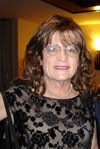 A mountain has an infinite number of profiles, though it is one form. Seen from one side it’s a dog, from another an angel, spiny sharp or fluffy soft. It is ominous and scary or friendly and inviting. A mountain speaks hospitality or it does not.
A mountain has an infinite number of profiles, though it is one form. Seen from one side it’s a dog, from another an angel, spiny sharp or fluffy soft. It is ominous and scary or friendly and inviting. A mountain speaks hospitality or it does not.
I continue up the refound trail, past the sign that said Donohue Pass rises this way. I look up at the mountain thrusting its immense rugged brow up into the sky and thought it friendly at last, that all my earlier problems of this day were past and I would cross over the mountain to the interior of the great Sierra wilderness.

The trail comes into a meadow at 10,300 feet with tiny flowers and a frigid creek, both speaking strongly of a springtime long past in the lowlands.

I ascend along the eastern slope, hewn to the rocky course of an ancient glacier. Dark white snowfields lie ahead and above me, and dark ledges of rock like bones of perished monsters. Sitting on a rock to rest, I let it take the weight of my pack, unbuckle the hip belt and chest strap, and step free from its shoulder straps.
There is something motivating and stark about the dry, cold, air of the High Sierras. It is like danger and joy and bright futures all mixed together in a bowl of pleasant uncertainty. When reaching for the summit, it is all the possibilities of a bright future; upon reaching the summit, it is pure joy. I sat there quietly, sending my senses out into the snow and rocks.

I encounter a small snowfield and walk easily across it. Then the trail disappears under snow so large the trail might emerge anywhere on the other side. Had it not been for a set of footprints coming the other way, I might have lost the trail again. But following them brought me out perfectly.
Donohue Pass—a cold and desolate pass. At the summit I peered over and saw immediately a tiny lake perched like a bird nest high in the crown of a rocky tree. And beyond the lake, another large snowfield obscures the trail. So I picked a way along the snow’s edge, figuring that the trail would surely appear somewhere in this direction. And thankfully it did.
I see treetops far below me now, far down in Lyell Canyon into which I’m descending, with peaks high above. It’s good to be hiking downhill instead of up. I rally somewhat with the lighter effort, both on my legs and in my psyche. There is still plenty of daylight for getting down into a reasonable camping area by the river, but I’m not feeling as good as I should. It’s not disorientation as with altitude sickness, but a combination of pains—a heel that hurts from some rock on which I must have landed too sharply, several blisters, and tiredness that seems unjustified.
The tick-tock of my paces, left-right, life-right. They are measured now, not too fast, not too slow. Balance the need for speed and the need for safety. Discipline would have to take the place of optimism, and conservation of energy for side explorations. I am behind where I should be for this time in the total trip, I know that, but I think that if I feel better tomorrow I can make up the difference.

By the time I reach the floor of Lyell Canyon, I am walking slow and start looking for a place to camp. I come to where the trail crosses the river, but not even a log bridge is here. I figure that if the water were lower, as it probably was before that thunderstorm, then a person could cross by stepping on exposed rocks. But today I waded across in two feet of water, boots sloppy full. On the far bank stands a grove of pines with a good flat place for the tent. I take it. Mosquitoes swarm about my face as I set up camp. Repellent keeps them from stinging, but their incessant buzzing, buzzing!
Most of what I write here is a compilation from notes written along the trail and at campsites. But the following is straight from my writing paper:
“I am camped at 10,000’ on Lyell Fork a mile or two down from Donohue Pass. Much mosquitoes. Not doing as well as on other backpacking trips. Will shorten hike and go directly to Yosemite Valley and skip the Red Peak Trail. Had to ford Lyell Creek and got feet wet, so camped here. Tomorrow I will not make Bernice Lake as planned, but will try to get close”
Gray prose like this is not my usual style; I find bright spots in most bad situations. I slide into the tent early to escape the mosquitoes. The river is full of unknown noises, whispers in an unknown tongue, snaps and crackles, footsteps of creatures.
















































